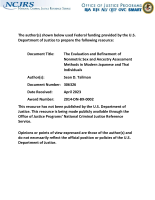School Disorder and Dropping Out: The Intersection of Gender, Race, and Ethnicity
Journal
Youth & Society
Date Published
2019
Agencies
NIJ-Sponsored
Publication Type
Research (Applied/Empirical)




